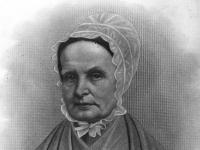Answer: Philadelphia Female Anti-Slavery Society
Juneteenth "June 19th" or Emancipation Day is a national holiday that commemorates the abolition of slavery. On this occasion, we remember one of Philadelphia’s most determined abolitionists, Lucretia Coffin Mott, a woman who spent most of her life working toward equality for all races and sexes.
Born in 1793 in Massachusetts, Mott was raised in a Quaker family that held firmly the beliefs of the Society of Friends, and she was educated at a Quaker school in New York. Around 1809, Mott moved to Philadelphia and several years later married James Mott, a teacher whom she had previously met in New York. The couple had six children (with five surviving). She eventually turned to teaching, began preaching at her local Quaker Meeting, and was elected clerk of the Philadelphia Women’s Yearly Meeting. She traveled around the Northeast and Mid-Atlantic states advocating for Quakerism and the abolition of slavery.
In 1833, frustrated with the “men only” membership restrictions of abolition societies, Mott helped form her own: the Philadelphia Female Anti-Slavery Society. The group was interracial and became deeply involved in lobbying for the end of slavery. Along with women’s rights crusader Elizabeth Cady Stanton, Mott helped organize the nation’s first women’s rights gathering (sometimes referred to as the Women’s Rights Convention) in Seneca Falls, New York, in July 1848. Mott remained a fervent abolitionist and outspoken women’s rights supporter throughout the rest of her life. She died at her home in 1880 and is buried in North Philadelphia's Quaker Fairhill Burial Ground.
In HSP's library are many more annual reports from the Philadelphia Female-Anti-Slavery Society, as well as other abolition groups. Some of Mott's papers can be found in the Pennsylvania Abolition Society records (#490).

